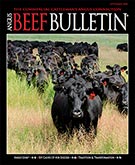 Alex Tolbert
Alex TolbertAssociation Perspective
Financial considerations.
I love the cattle business — always have, always will. The Angus cow, for me, is the most intriguing and the most resilient animal on the planet. Her ability to turn grass and corn into a mouthwatering Certified Angus Beef® (CAB®) brand ribeye is nothing short of a miracle. No matter the environment, no matter the demand by the consumer, no matter the fad … she keeps coming back and asking for more. I love her!
Problem is, she doesn’t always love me back. Aside from her attitude at calving, she’s not always willing or able to return thanks for providing for her — endlessly. That point is where her real lack of love is so evident. Maybe it’s not so much her lack of affection for me, but certainly a lack of affection for my wallet.
With this in mind, my wife and I recently completed a study on finances by Ron Blue, a financial planner and author. The principles he outlined were incredibly simple, countercultural but simple — not to mention difficult to commit to. As you study the principles, it’s easy to see that they are applicable to anyone at any level of income. His building blocks of financial wisdom are as follows:
- Spend less than you earn.
- Avoid the use of debt.
- Build room for margin.
- Set long-term goals.
As you look at the list, the first concept seems intuitive; however, in the world we live in today, that’s not the norm. For those of us in agriculture, sometimes it’s impossible.
The second concept is certainly one that is foreign language to us, especially if you are like me and borrowed to get started. If you can work toward this end, it can provide a stronger financial position.
Building room for margin or the unexpected provides for stability, especially in our business, which by nature is unpredictable. Proper planning for margin or emergencies can aid us to avoid the use of debt when times get hard or the unexpected happens.
Setting long-term goals provides the frame work within which we can base sounder financial and business decisions in the present. When we have a goal — an endpoint — and we keep our focus there, it can help us process information and make better short-term decisions based on these long-term goals.
One of Ron’s other foundational concepts is that there are no independent financial decisions. Our finances are a limited resource, so every decision we make affects other areas of our finances. For example, the more we give (to charitable institutions), the less we will owe in taxes. Or the more we spend on equipment, the less we have to spend on anniversary gifts … and vice versa.
I certainly don’t claim to be a financial expert — I’m far from it — but it has been an area that I have experienced growth lately. For me, as I have slowly implemented these principles, I have seen fruit from my efforts.
These concepts have also helped me view and process other areas where I struggle, like my time. Finances are something that affect all of us and whether in abundance or in lack, it’s important to have a process and have a plan.
“The plans of the diligent lead surely to abundance, but everyone who is hasty comes only to poverty.” Proverbs 21:5
Editor’s Note: Alex Tolbert is the regional manager for Region 3, including Kentucky, Ohio and Tennessee. Click here to find the regional manager for your state.






